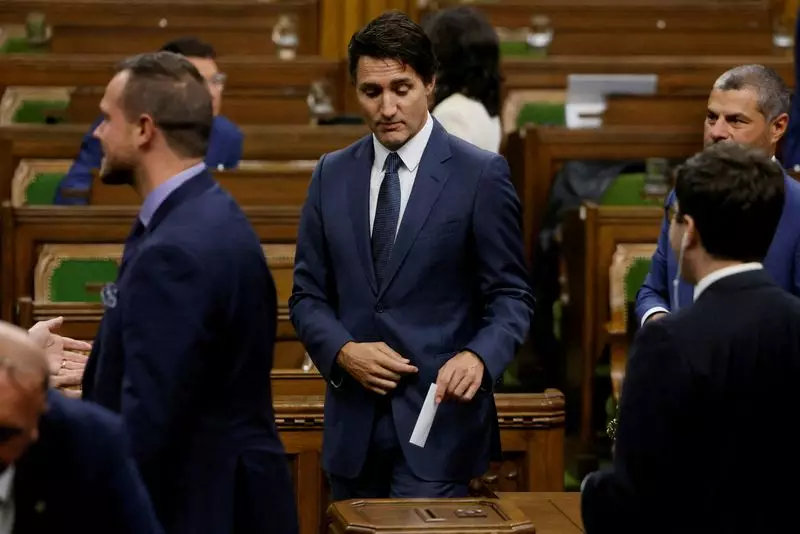In recent days, Canadian Prime Minister Justin Trudeau’s leadership has come under intense scrutiny as his Liberal Party finds itself lagging significantly in national polls. The impending special election in the Montreal riding of LaSalle—Émard—Verdun may serve as a litmus test for Trudeau’s future at the helm of the party. With surveys indicating a surprisingly competitive race, the stakes are high—losing this long-held seat could exacerbate internal calls for a leadership change and put Trudeau’s position in jeopardy just ahead of the next general election slated for October 2025.
Historically, the Liberal Party could easily rely on LaSalle—Émard—Verdun as a stronghold, having garnered a compelling 43% of votes in the 2021 federal election. However, recent polling suggests an alarming shift in party loyalty. Now, the Conservatives, led by Pierre Poilievre, appear to be garnering a staggering 45% of public support—an unprecedented figure in Canadian political contexts. With the Liberals resting at a mere 25%, the landscape is shifting, raising questions about Trudeau’s viability as leader.
This drastic decline in support can be attributed, at least in part, to growing discontent among voters regarding the escalating cost of living and an ongoing housing crisis. As many Canadians struggle to keep their heads above water financially, dissatisfaction with the current government has grown. The growing fracture within his party became visible as some Liberal members openly voiced their concerns about Trudeau’s leadership. For instance, Quebec MP Alexandra Mendes expressed that the overwhelming sentiment among her constituents was one of frustration, hinting at an urgent need for a new direction.
Trudeau has faced escalating challenges during his near nine-year tenure. His government has been marked by a series of controversies and disappointments, including broken promises, particularly concerning electoral reform, which has left many citizens disenchanted. The echoes of citizens’ anger were palpable as approximately 80 activists who felt betrayed by Trudeau’s broken 2015 pledge to revise Canada’s voting system prepared to have their voices heard in the same election.
Despite his efforts to maintain a steady course, Trudeau’s insistence on leading the party into the next federal election without addressing the prevailing issues may alienate the core of his base. Coupled with rising costs of living, educational pressures from a surge in temporary residents, and public outcry over skyrocketing housing prices, Trudeau’s political capital is rapidly diminishing. Voters are ultimately looking for solutions and accountability, and if they feel their leaders are not addressing their concerns, a shift in loyalty is inevitable.
Pierre Poilievre’s ascent in polling may not solely rest on the Liberals’ decline but also on his effective messaging and promises. Poilievre openly criticizes the federal carbon tax, which he claims exacerbates economic hardship, and has introduced cap immigration limits as a direct response to housing shortages—a move that resonates strongly with voters frustrated over escalating property prices. Furthermore, as he draws parallels to the American right, including the “Make America Great Again” ethos of former President Donald Trump, Poilievre poses a direct challenge to Trudeau’s narrative as a socially progressive leader.
Nevertheless, portraying Poilievre merely as a conservative reactionary may be a risky strategy for the beleaguered Liberal Party. Electing to focus on demonizing their opposition without constructing a robust agenda of their own could alienate those who might otherwise offer them their vote. The urgency to craft resonant policies that address Canadians’ immediate concerns cannot be overstated as the election season approaches.
With voting anticipated to conclude at 9 p.m. on election night, the results will unveil not only the electoral fate of the LaSalle—Émard—Verdun constituency but also the broader implications for Trudeau’s leadership and the Liberal Party’s future. As counting is complicated by the presence of activist candidates frustrated with the current government, the extended waiting period for results may serve to amplify the tension surrounding Trudeau’s leadership.
As the Liberal Party grapples with declining support, increasing internal dissent, and mounting public dissatisfaction, the upcoming election holds significant ramifications for the future of Trudeau as Prime Minister. If the Liberals lose ground in what should be a safe seat, the subsequent calls for change will likely intensify, reshaping the political landscape in Canada for years to come.

